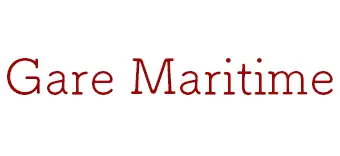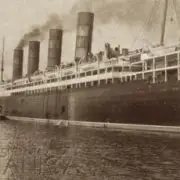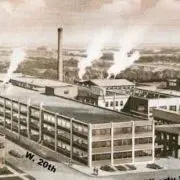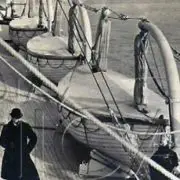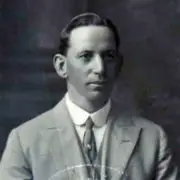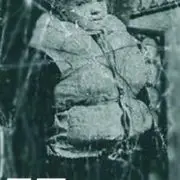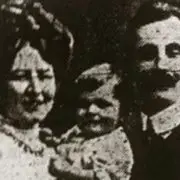The Lusitania : Part 7 : Passengers of Distinction
H.B. Harris’ Kin Safe
Dwight C. Harris, a theatrical manager, who was an uncle of Henry B. Harris who lost his life in the Titanic disaster, is one of those who were rescued after the Lusitania sank…
Dwight Carlton Harris, 31, departed for England that May “in connection with his theatrical business.” He was also to meet with his fiancée, Aileen Foster, daughter of Colonel Sir William Yorke Foster, third baronet. Like many other passengers, Harris passed time during the long delay on May 1st. writing letters and postcards to be mailed from the ship. A letter to his mother and grandmother survives, a light and chatty note in which he observed, among other things, that the Lusitania seemed very small after being on board the Olympic.
Harris wrote to his mother again on May 10, 1915, from Jury’s Hotel in Dublin. He began by describing the disaster as an awful experience that had left him in shock which was only beginning to lessen somewhat as he commenced writing.
Thank God I’ve come safely thru the most awful experience anyone could possibly imagine! I can hardly write about it. I am suffering rather badly from the shock, but fortunately feel better this morning.
The voyage up to Friday at 2 was perfect. I have never seen the ocean so calm. In bad fog Friday morning from 7a.m. to about 11. Superb clear sunny day after. I got up at 11, and read on deck for a while. About 12:30, I went to the Purser’s office and got the package of jewels and money; $500 in gold. I went to my cabin, hung the diamond and pearl pendant around my neck, also the engagement ring and the emerald ring. I pinned the big diamond brooch inside the pocket of my coat, and before leaving the cabin unlocked the canvas bag that had my life belt in it! I put the $500 gold in my trouser pocket, and then went down to lunch!
While at the table, I had a most intense, nervous, feeling come over me, and I got up and left without finishing my lunch. I went to my cabin, took the book, and came out on the port deck. Walked back around to the starboard side; when about half way up the deck I saw the torpedo coming! A white and greenish streak in the water. I stood transfixed.
A moment later, a dull explosion which shook the ship and sent a huge column of water twice as high as the ship; sea water, coal, splinters of wood, etc. came down on our heads. I flattened up against the side of the ship, but got soaked.
I rushed back around the end, and by the time I got to the main entrance the ship was listing well over to starboard. I was afraid to go in, to my cabin, as I thought she was going down; so made for the bow. I climbed over the rail and down on the deck- I could hardly stand, the ship was listing so.
I took off my shoes, and threw away my coat and hat and book. I took a look at things, and decided I must have a life belt, so I climbed up again and rushed to my cabin; secured the life belt I got at Wanamaker’s and put it on, and went down again to the bow.
By this time the water was almost up to the deck. An officer called to me from the bridge to come up, but I shook my head. I got up on the rail, and when the water got right up to the deck I jumped overboard, and swam away from the ship as much as possible.
I was carried the length of the ship, and saw everything that happened. The first lifeboat that was in the water (had) only two sailors in it! They called to me to swim to it, but I kept on. The second boat was suspended, and hanging straight down. Evidently, the ropes at one end had jammed. The third and fourth were crowded with people- I think both of them reached the water safely. The fifth boat upset as they started to lower it, and everybody fell out. I think the sixth boat got safely down.
By this time I was astern. When I was going past the 4th boat, the captain’s bridge was level with the water, and the stern rose rapidly, and the ship plunged forward like a knife blade into the water. Then a great swirling, greenish white bubble formed where the ship went down- which was a mass of struggling humanity, and wreckage. The bubble got bigger and bigger, and fortunately came to within twenty yards of me, shoving wreckage with it.
I was making for an overturned boat when I heard a little boy scream for his father. I swam to him; told him not to cry and to take hold of my collar, which he did. Bravest little chap ever saw! I managed to reach the upturned boat, got the little chap on it with great difficulty, and then got up myself- pretty nearly played out. I could hardly move my limbs, I was so cold.
We were on the upturned boat about ten minutes when some sailors came and took us off in a damaged life raft. We picked up about 10-12 people, but couldn’t take any more as the raft looked like it was going to sink any moment – it was half full of water!
We headed for a sailboat in the distance. The cries for help from those in the water were most awful. Not a ship in sight when the steamer sank; only the little sailboat for which we were heading. I never expected to reach it, as I thought we would sink any moment. One of the undamaged lifeboats got to the sailboat before we did, and put people aboard and then started back; picking us up after we had been on the damaged raft an hour.
Soon afterwards a mine sweeper, the Indian Empire, picked us all up and returned to the scene of the disaster, rescuing a great many. I am glad to say the little chap I found was returned to his mother, father, and brother, all of whom were picked up by our boat.
We started back for Queenstown after 7- ready to dock safely at 9:30. The periscope of a submarine was seen once or twice while we were at the rescue work! But fortunately it did not try to torpedo us, a far as I know!
Fortunately, I did not see the harrowing scenes on deck. There was no panic exactly, but naturally great excitement. The most frightful thing of all was the innumerable dead bodies floating about in the water- men, women, and children!
The first thing I did on land was to cable I do hope you got it soon after hearing the news! I can imagine the horror with which the news was received in the city. I gave in my name at once, and an officer took me to one of the hotels. I could hardly walk as I bruised one of my feet.
The townspeople cleared the street and applauded us as we passed. Every available accommodation was packed. I slept, or rather laid awake, at the Hotel Imperial in a room with six men. One, a Canadian, found his son in the hospital with both legs broken. Another in the same room rescued his sister, but her husband was lost. The scenes at the Cunard office there were indescribable.
Evidently, none of the people, 4 in number, that sat at my table were saved. An awfully nice Englishman and his wife, named Grudge, who lived in British Honduras- they were going to England for a month to see their little girl! Another English lady, Mrs. Watson, who had come from Hong Kong, and a Canadian man, Mr. Chabot, from Toronto. I made enquiries everywhere, but could not find them and their names are not on the list of saved. We all used to play the Characters game, after tea in the afternoon in the lounge, and also that Game of the World! Friends of theirs, Mr. and Miss Painter, used to play, too. Miss P. was saved, but not her father.
Saturday morning, I got up at 8, and went out and bought a suit of dry clothes. I bought a dry undershirt, pajamas, socks and cap the night I landed! I got a blue suit, and a soft shirt and collar, and a rain coat. While I was fitting myself out, a young American about 18 came in to the shop; said he wanted some dry clothes. The shop keeper asked him if he had any money, and when he said no, he was sending him away. So I called him and told the shopkeeper to fit him out, which he did, and you have never seen anyone so grateful. He had such an awful expression on his face, I will never forget it. I asked him if he had hit his face, but he said no, and then I realized he must have lost someone. I asked him, and he said it was his mother. Poor fellow- I thank God you weren’t with me.
I came up to Dublin by the 3 p.m. train, and have been in bed since I arrived, utterly done up. I had the Dr. yesterday- I am stiff from head to foot, and my feet are very sore. I cut my right foot, and it looked yesterday as if it was a bit poisoned so I sent for the Dr. He has treated it, and it looks much better already.
I am going to London tonight. Train leaves 8:10, and I get there 6 a.m. The boat crossing, which I dread, is only 2 hrs and 40 min.
Dwight Carlton Harris had an excellent eye for detail, and an equally good memory. Nearly everything he claimed to have witnessed can be verified through other sources, and most of the people he described identified.
Boat 1 was lowered with only two or three men in it. It later took in survivors from the water, and from the dangerously overcrowded Boat 15. the sequence of boats wrecked, and the sequence of boats lowered successfully is correct, as well.
A letter published in a 1915 Butte, Montana, paper gives a probable identity to the boy Harris rescued. Thomas Henry Richards wrote that when he and wife and three children were thrown into the water from A deck, starboard, in second class, he was able grab one of his boys; Cecil. His other son, Percy, was swept away by the turbulence as the ship sank, but was later found alive. He had been pulled on to an overturned lifeboat by a man who found him struggling in the water, and had been brave, crying only for his father. The Richards’ infant daughter, Dora, was torn away from them when the family was washed overboard, and lost.
Harris was put up in a room in Queenstown with several other survivors. One was a Canadian man, whose son had survived with “2 broken legs”; this was probably George Hook, whose son, Frank, had broken his arm. The man who had saved his sister but lost his brother in law was possibly John Moore, whose sister, Jeanette Mitchell, was rescued but who lost her husband and infant son.
Harris searched for his shipboard acquaintances. He recalled an “awfully nice” English couple named Grudge, en route from British Honduras to visit their little girl in England. This was actually Joseph and Evelyn Dredge. Completing the table were Mrs. Katherine Watson, an English lady traveling from Hong Kong, and Mr. David Chabot from Toronto. All of Harris’ tablemates were lost, as he feared, but Miss Irene Paynter, a friend of Mr. and Mrs. Dredge who would join their games, survived. Her father, Charles, the final member of their group, did not.
The young “American” man Harris met in the tailor’s shop could have been Allan Beattie, 18, Stanley Taylor, 14, or one of the Gardner boys.
As for the claim made in some 1915 newspapers that he was the nephew (or uncle) of Henry B. Harris? The truth of that is undetermined at this time. Dwight Carlton Harris’ father, William, was born in Chicago and was deceased as of 1916. Henry B. Harris was born in 1866, in St. Louis, Missouri. His father was William Harris. Both names are common and there is no evidence, yet, other than the 1915 accounts to bolster or negate the supposition that Dwight Harris’ father might have been William Harris junior, brother of Henry B.
Dwight Carlton Harris’ only on-board acquaintance to survive the disaster, Irene Paynter, died at age 82, on February 14, 1967, in Devon, England. A letter she wrote to the mother of Richard Prichard reveals that Mr. Paynter was evidently killed by a blow to the head.
Percy Richards, the young boy who Harris saved, committed suicide in Cornwall, on June 24, 1949, at age 40.
Dwight Carlton Harris married his fiancée, Aileen, as planned. They resided in England for a time, and after they settled in New York, continued to travel back and forth to Europe; making over a dozen crossings between 1919 and 1939. They had two children. Mr. Harris died in New York City, on December 7, 1970, at the age of 86.
